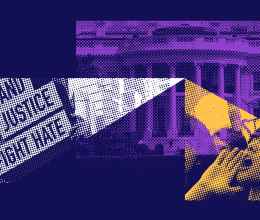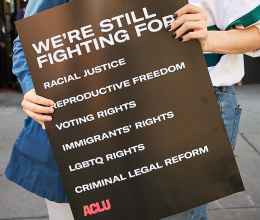
50 Years after Gideon v. Wainwright, Florida Supreme Court issues decision allowing overburdened public defenders to call on the state to find other representation for poor defendants
FOR IMMEDIATE RELEASE: May 23, 2013
CONTACT: ACLU of Florida Media Office, (786) 363 - 2737 media@aclufl.org
Today, the Florida Supreme Court issued an opinion which will have a major impact on the way in which criminal defendants who cannot afford an attorney are treated by the criminal justice system.
In the case, Public Defender (11th Cir) v. Florida which consolidated two separate cases, the Court found that the overburdened and underfunded public defenders’ offices can decline to take on additional legal representation for entire groups of defendants in order to ensure that they fulfill their Constitutional obligations to their current clients. In that event, the state is required to find and pay for other legal representation that the public defenders cannot take on.
The following is a statement from The American Civil Liberties Union (ACLU) of Florida on the impact the decision will have:
Fifty years after the United States Supreme Court ruled in Gideon v. Wainwright – a case which originated in Florida –that the U.S. Constitution requires that a qualified defense attorney be assigned to every person who has been accused of a crime but cannot afford an attorney, today’s decision from the Florida Supreme Court is a turning point in the crisis of our broken public defender system.
In the decades since Gideon, public defenders’ offices across the country have become so overburdened due to a mounting caseload and cuts in funding that attorneys routinely handle twice as many cases as legal experts recommend. Because of this, in spite of their hard work, it has become practically impossible for public defenders to do the job of providing the competent legal representation to which all defendants are entitled. Years of neglect, underfunding and handicapping from politicians attempting to appear ”tough on crime” have brought the justice system to the critical mass that today’s decision from the court recognizes: public defenders’ offices as they exist today are unable to take on the flood of new defendants and still comply with the critical mandate of our Constitution.
This decision will likely result in a cascade of public defenders’ offices throughout the state stepping forward and stating that they are too are overwhelmed and that without additional resources they will need the state to identify and fund other representation for entire groups of defendants. When the state attorney chooses to prosecute someone, the legislature must adequately fund the public defender system to provide competent representation. Perhaps this will make it impossible for Florida legislators to continue to ignore our state’s broken indigent defense system and our shameful over-criminalization and incarceration rates that have left our justice system in a state of crisis.
For too long, in spite of Gideon, being too poor to afford an attorney has meant being too poor to afford justice. Today may be the first step in finally changing that. The Miami Dade Public Defender’s Office sounded the alarm, and we call on our elected leaders to act now to fix it.
A copy of the decision issued today is available here: http://www.floridasupremecourt.org/decisions/2013/sc10-1349.pdf
The ACLU recently ran a series of stories highlighting the burden faced by overworked and underfunded public defenders entitled “Gideon: Unfulfilled at 50.” Those stories are available here: http://www.aclu.org/blog/tag/gideon-unfulfilled-50






